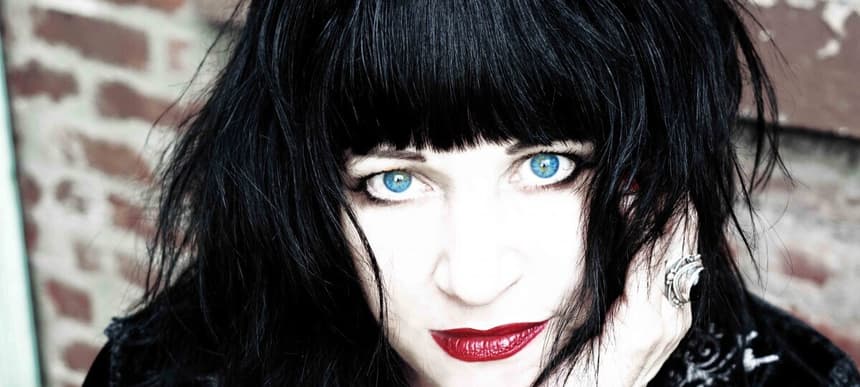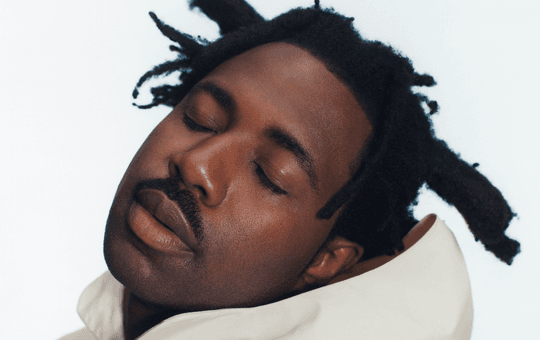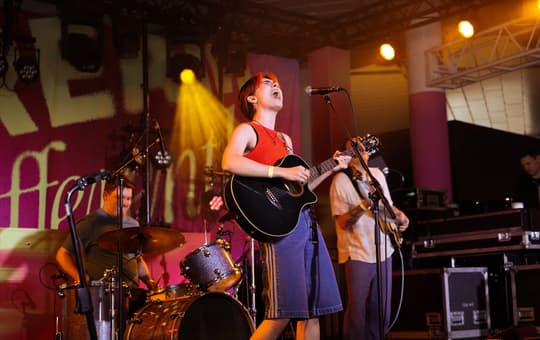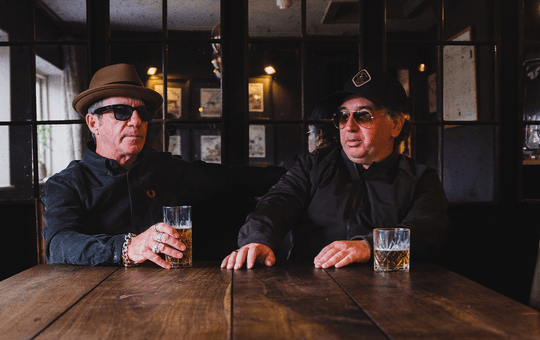
The chronic outsider: a conversation with Lydia Lunch
Since co-founding the (in)famous and hugely influential Teenage Jesus & the Jerks with saxophonist James Chance in a very different New York City in 1976, when an emerging yet ultimately fleeting No Wave philosophy informed the arts zeitgeist of the city, the ever-prolific Lydia Lunch has since founded or collaborated with countless other musical projects (8 Eyed Spy, Big Sexy Noise, Retrovirus, Cypress Grove, Medusa's Bed, Rowland S. Howard and The Birthday Party, J. G. Thirlwell) and expressed herself in just as many mediums, from photography, to spoken-word, to poetry, to activism. The list goes on, and on, and on.
Taking the first-ever vinyl release of Lunch's spoken-word album 'Conspiracy of Women' on Nicolas Jaar's Other People label as an opportunity to catch up with her and discuss her life, her work, and just to see what's going on in that crazy singular creative head of hers at the moment, I met Lunch at the Howl! Happening Gallery in New York's Lower East Side, where she had some work up as part of the 'So Real It Hurts' exhibition and semi-retrospective.
We conducted the interview on the couch of her response installation to Tracey Emin's My Bed, where the domestic detritus of the seediest, angriest, imagined young woman in American suburbia was strewn around. Needless to say, friends came by, wine was drunk, and Lunch had plenty to say.
How did this vinyl release of 'Conspiracy of Women' on Nicolas Jaar's Other People label come about?
Lydia Lunch: "I got an email about last August, from some guy I didn't know, saying 'I really liked your record 'Conspiracy of Women'.' And that was great to me, because the record is 25 years old, and it's one of my main spoken word pieces. I'm like, 'That's cool, thanks very much!' I thought nothing of it. And then in January, I got another email from the same guy saying, 'I really like this record, and I DJ, and I've been playing it and mixing some sounds with it, and people really like it.' And I'm like, that's great, 'cause it's a radical spoken word record about war. He sent me the mix of what he was doing, and I thought it was amazing – then he said he wanted to put it out. It's as old as he is; came out the year of his birth. We met in New York, and I'm like, 'This guy is great!', so he did a remix, and then I did a remix of his remix, with Weasel Walter's music."
How do you look back on the album, and how was it working with J. G. Thirlwell at the time?
Lydia Lunch: "It was a live recording. It's part of the progression of spoken word that I've done since under Ronald Reagan, when I started getting political – using the language of the enemy, and the aggression, to try to make some points, to try to rattle the bird cage. And working with J. G. Thirlwell, who I lived with for seven years, was, of course, amazing. I did many recordings with him, but he didn't have anything really to do with this. You know, he's one of the great composers of this and the last century. He really started industrial music. He started sampling, when it was just literally cutting tapes together with scissors. We're still very good friends."
Did you and Thirlwell influence each other in any way?
Lydia Lunch: "No. It's interesting – he's a maximalist, and I'm a minimalist. When we came together to do things, like we did on our record called 'Stinkfist' – which was seven drummers and vocals, and really one of my first what I call 'illustrated word' pieces – it was interesting to bring our different methods together. And then of course we covered Don't Fear The Reaper, and we did a few other singles. I don't think we influenced each other as much as we just, like most of my collaborations, came together and invented something that wouldn't exist outside of that combination of people. I'm still a minimalist, and he's still a maximalist."
You seem to be very open to using any media, and you've collaborated a lot with other artists – they seem almost inherent to the way you work.
Lydia Lunch: "I'm a conceptualist, so whenever I have a concept – and everything begins with a concept – I never think of who I want to work with, I think of who's appropriate to the concept. So if I have a concept of, like, swamp rock, [I think of] Rowland S. Howard. If I have a concept for raunchy rock'n'roll, I think Gallon Drunk, James Johnston, Ian White. So it's just that I always start with a concept, it's always about the words, and then: 'What is the medium at the moment that makes the most sense to me?'"
Is there an area or particular location within post-war or contemporary art that you feel associated with?
Lydia Lunch: "I've lived in many cities, you know? I left New York in 1990; I moved to Pittsburgh, San Francisco, L.A., London. I lived in New Orleans. I lived in Barcelona. I've been involved in various movements – which were only movements in retrospect, especially No Wave, and Cinema of Transgression, and then whatever we call what the Birthday Party phase was – but I always feel somehow outside of all of it. Whatever city [I've been in], I curated a lot of shows. In New York, when I first was doing spoken word, I put a lot of people on the stage for the first time – Nick Cave's first show, Vincent Gallo, Bibbe Hansen who's Beck's mother – so I'm really a cattle prodder like that. But mostly I approach other people to do stuff, very few people ever approach me – because it's like, 'Oh, we can't ask the bitch,' or 'We can't ask the queen…' – so I feel outside of everything. Yet when I'm in a scene, I'm very connected to the people. I always say I feel like a chronic outsider, and I like that feeling. That's why I've lived in Spain for almost 10 years – I don't even speak Spanish."
Is there anything you're working on right now, that you can talk about?
Lydia Lunch: "Well, Retrovirus – which is my group – just had an album out called 'Urge To Kill', which is a retrospective of my career. As a contrarian, it makes sense to me to do a retrospective. A lot of this music was never done live, or a lot of it was done before a lot of the people who are coming to the shows were born. I think there's a real need for ugly, aggressive, hardcore, raunchy rock that nobody's doing, so Retrovirus makes perfect sense to me. Especially with the musicians in it – Bob Bert, who was in Sonic Youth and Pussy Galore, Tim Dahl, who's played with John Zorn, Marc Ribot, Yusef Lateef, and Weasel Walter, the greatest composer and improvisational guitar and drummer in America at the moment, who knew my material because it influenced him at 14. It's very exciting for me to do Retrovirus – it shows my musical schizophrenia."
"There's a real need for ugly, aggressive, hardcore, raunchy rock that nobody's doing." – Lydia Lunch
Is there anything going on with Big Sexy Noise right now?
Lydia Lunch: "Big Sexy Noise is my raunchy rock group. We've done some shows in Italy; we're continuing to do some things. Big Sexy Noise was the first band I ever did two albums with – and now with Retrovirus, we've done two albums. It's this new phase. We've pretty much pinnacled, although we keep talking about another album. I've worked with [Big Sexy Noise members] James Johnston and Ian White in many different forms for over 12 years. They live in London and I really enjoy working with them. I would actually like to do an album where one side was almost like Alice Coltrane, improv, 30-minute-long psycho rock-out… and I don't even know what the other side should be.
"But Big Sexy Noise – we're not done, and we will continue, but right now I have Retrovirus. That's the priority. I also have my desert blues group with Cypress Grove; we released an album called 'Fistful of Desert Blues'. And I have a three-piece female improv group that only plays in Eastern Europe called Medusa's Bed. That's enough for now, musically. And then 'Conspiracy of Women' is out, and my art show is up, and I've got a few books to write…"
"I would actually like to do an album where one side was almost like Alice Coltrane, improv, 30-minute-long psycho rock-out… and I don't even know what the other side should be." – Lydia Lunch
The first album I heard from you was '1313', and the first song was Atomic Bongos. Every time I read about you, you were always associated with the label No Wave. Do you ever get tired of it?
Lydia Lunch: "I love the term No Wave! I want no other term. I want No Wave hysteria. I love No Wave because it says nothing – it's like 'No Wave, no anything else'. To me, No Wave is audience un-friendly. It's dissonant, it's anti-tradition, none of it sounds alike. None of my music sounds alike – although there is a connective tissue. I like that No Wave is having a kind of resurgence and some influence in music, because it's really just about putting it out there as aggressively and brutally as possible and not giving a shit about the fucking consequences. And that has to do with photography, film, music, and spoken word – it's not just a music thing. I love the fucking term because nothing else makes sense to me. I never did punk music – I have nothing to do with fucking punk rock, I thought it was infantile. No Wave was very different, because punk rock was a social explosion – political, but fashion-oriented, and you know what it sounds like. [With] No Wave, nobody had any fashion sense except for me and James Chance. That wasn't the point of it. Nobody sounded alike, and we didn't give a fucking shit about anything. We didn't feel like we were all in this thing together, we felt: 'I'm insane, and if you are too, cool!'
"It was only a movement, in retrospect. At that point I was so anti-everything; everything had to meet a certain extreme validity, otherwise what's the point?"
Having grown up in neighbouring Buffalo myself, I had to ask: do you have any relation, or have you kept any, with your native city of Rochester?
Lydia Lunch: "Not really – my parents left there. But I was in Buffalo recently. I played with Retrovirus there last year [and] a lot of kids came from Rochester. Rochester and Buffalo had a lot of music that always came there, in the '70s especially. I was really lucky to grow up there, because in the early '70s, when I started going to rock concerts at like 12, all the glam bands came there – Roxy Music, Slade, KISS, Lou Reed… Mick Ronson even lived there for a while. We had the Hell's Angels, and we had Kenneth Bianchi before he was the 'Hillside Strangler' murdering people. It was a great scene for a young girl in Rochester. What's interesting is that Rochester didn't fall like Buffalo fell, although when I was there, it was undergoing the race riots. But definitely being in Rochester and going to rock concerts at 12 to 14 and going backstage, it really informed [my upbringing]. I knew what I had to do."
"I love No Wave because it says nothing – it's like 'No Wave, no anything else'. To me, No Wave is audience un-friendly. It's dissonant, it's anti-tradition, none of it sounds alike." – Lydia Lunch
I read that a few years ago, you did go to some shows at the DIY venues in Brooklyn…
Lydia Lunch: "What surprises me is there's some really incredible musicians [in New York], and nobody fucking gives a shit. I was smart in that from '77. I kept going back to Europe, where they do care. My group consists of Tim Dahl and Weasel Walter, who get no credit in this country, [whereas] in Europe, people know who they are, they still remember tours they did, like, 20 years ago. And I'm like, 'Just don't play this crap if nobody fucking cares!' It's why I left here in 1990. At least in Europe you can get some support to do shit.
"This is the sad condition of this city – kids from Minnesota have come, and they want the Minnesota, they want the brewery beers, with their beards, sitting around talking bullshit about what they'll never do. This place has become pretty fucking sad, but it doesn't matter because there's still good shit everywhere. What kills me is when people think this is the centre of the universe, this is the asshole of the fucking universe. There's so many cool cities, this is bullshit. It's like the toxoplasma parasite from cat litter that gets into people's brains and makes them think this is the only place to live – but it's just like it's a fucking disease. You're a cog in the machine; there's a million great places. As a writer, I always felt it necessary to move around. My collaborators are always everywhere. I have to go for the architecture or the economy, I always have the itch to go. I was in New York in '77 to '80, '81 – I left for four years, I came back, I stayed for five years, I got the fuck out. So people always think I'm like a 'New York artist', because as Weasel Walter said – 'I am what New York once was.'"
You've been permanently settled in Barcelona for the past several years. How'd you pick Barcelona out of all places?
Lydia Lunch: "First of all, Bush stole the second election. This country was going into fascism. Spain was 40 years out of fascism. People there have no attitude or aggro. It takes three minutes to go from the front door of the airport down through security and outside to get a cup of coffee. It's cheap to go anywhere. People don't have a problem with sex, they don't have a problem with drugs. Everybody loves life. I went there first in '84, and I just said it's just the most beautiful city. And its history is the most perverse, from the inquisition, to Dali, to Gaudi, to the architecture, and the bullfights, and the fact that it's a matriarchy at the bottom of it, 'cause the grandmother is the most respected. You see teenagers, they're all in love with each other, boys and girls. It was such a relief to me to go there, out of this country – God knows where it's going fucking next, because we've got one of two choices that are the same, and Hillary is worse than any of them."
Other People released 'Conspiracy of Women' on May 3rd 2015 (buy).













